Books (Published)
Covid-19: Experiences of principals and teachers in special schools.
O’Síoráin, C. A., Henefer, J., Bates, J., O’Connor Bones, U., Goodall, C., Kenny, N., Mc Guckin, C., Young, K., & Shannon, C. (2023). Learning from the experiences of principals and teachers in special schools in Northern Ireland and the Republic of Ireland during Covid-19. A Report for the Standing Conference on Teacher Education North and South (SCoTENS). Armagh, Northern Ireland: The Centre for Cross Border Studies. Armagh, Northern Ireland: The Centre for Cross Border Studies. (ISBN: 978-1-3999-6899-7).
Available here.
Adopting a Universal Design for Learning (UDL) Mindset in Higher Education.
Together with my very good colleagues and friends, Mary Quirke and Patricia McCarthy, we are delighted to bring this new book to the conversation about inclusive education in higher education. Whilst there has been much written about UDL, most of this has been targeted at the school and further education sectors.
Indeed, when many UDL books are written with a higher education audience in mind, they are often “how to” and “checklist” type books. This book differs – it moves UDL thinking and practice beyond the traditional triad of “teaching, learning, and assessment” – to recognising that “inclusion is everyone’s business”.
This book seeks to develop the conversation that each and every one of us involved in higher education needs to have – with ourselves and with each other. That is, how can we make higher education institutions more inclusive for the diversity that exists among our learners and our colleagues. After all, don’t we all have some need to feel understood and included?
Quirke, M., Mc Guckin, C., & Mc Carthy, P. (2024). Adopting a UDL attitude within academia: Understanding and practicing inclusion across higher education. London: Routledge. (ISBN 9780367673970 [hbk], ISBN 9780367684686 [pbk]; ISBN 9781003137672 [ebk]). DOI: 10.4324/9781003137672
Available here.
Transition for pupils with special educational needs.
Launched at the European Conference on Educational Research in Hamburg (Sept. 2019).
Together with colleagues from across Ireland and the UK, we have been working a lot on the issue of transitions for children and young people with special educational needs. This new book is a timely update to our research and is focused on the implications of the research findings for both policy and practice.
Some of the research that contributed to this new book can be found (and downloaded for free) in other sections of my website.
Scanlon, G., Barnes-Holmes, Y., Shevlin, M., & Mc Guckin, C. (2019). Transition for pupils with Special Educational Needs: Implications for inclusion practice and policy. Oxford, UK: Peter Lang Ltd. (ISBN: 978-1-78707-971-7). DOI: 10.3726/431873E
BeSAD: Bereavement, separation, and divorce.
”Children go to school with more than the bag on their back” – a very poignant finding that Aoife Lynam reported from her pioneering research exploring “normative” bereavement in Irish schools.
Cyberbullying: From old wine in new bottles to AI and robots.
When I was working on my doctoral research, the internet, email, and Web 2.0 technologies and services were just beginning to appear. Social media had yet to develop. Fast forward a few years and the issue of cyberbullying was part of common discourse.
Lucie Corcoran’s doctoral research added much new knowledge to this emerging field of study.
I have been collaborating with Lucie and international colleagues on issues related to: defining the area, prevalence studies, legal and policy issues, coping strategies, and prevention and intervention strategies.
Lucie and myself have been fortunate to have had the opportunity to edit a Special Issue of a journal (Societies) that was also published as a book (all papers are open access), and edit a major collection of papers for a book by NOVA publishers.
Apart from these edited collections, we have written chapters for other books and published some papers – all available for free on this website.
Some of the research that contributed to this new book can be found (and downloaded for free) in other sections of my website.
Since the 1970s, a wealth of research and public attention has focused on the issue of traditional, or face-to-face (f2f) bullying (Mc Guckin, Cummins, & Lewis, 2010), and this has contributed to a deeper understanding of the nature of the behaviour, the potential impact of involvement in bullying, the characteristics of those involved directly and indirectly, and crucially the various approaches which can be undertaken to effectively counter such behaviour.
However, in recent years, cyberbullying has emerged as a major issue across societies and cultures, and for schools, parents, children, and national governments (see Smith & Steffgen, 2013). Despite some similarities with traditional (f2f) bullying, there is sufficient difference to warrant the current swell of research which focuses on cyberbullying per se (Smith, 2012). Indeed, those tasked with the challenge of countering bullying and dealing with its negative effects now must attempt to cope with this additional, and often, compounding factor.
These books provides a contemporary and detailed examination of the issues related to traditional (f2f) bullying and cyberbullying – from a perspective that draws upon the most pertinent research and informed opinion from key researchers and thinkers from across the globe. The initial and pioneering knowledge about cyberbullying has now moved to a newer, more mature, position that has been able to delineate the nuances associated with the issue, and importantly, yield robust insights for those involved in, or tasked to deal with, cyberbullying. However, consideration must also be given to current knowledge on traditional bullying as research consistently indicates that, compared with cyberbullying, this form of aggression is experienced by a substantially greater number of children and adolescents (e.g., Olweus, 2012).
The books brings together a collection of diverse, yet interconnected, chapters that represent the most up-to-date perspectives and evidence from across the globe. Collectively, these chapters demonstrate how scholars and policy makers, from disparate disciplinary or stakeholder starting points, are progressing in their understanding of each other’s language and requirements – thus facilitating the important move towards a more coherent and understandable agenda that seeks to minimize the potential risks to children and young people, understand the relationships between involvement in school-based and cyber-based bullying and associated biopsychosocial factors, and importantly, integrated and evidence evidence-informed intervention and prevention programmes.
Mc Guckin, C., & Corcoran, L. (Eds.) (2016). Bullying and cyberbullying: Prevalence, psychological impacts and intervention strategies. Hauppauge, NY: Nova Science. (ISBN: 978-1-53610-049-5).
Available from here.
Mc Guckin, C., & Corcoran, L. (Eds.) (2016). Cyberbullying: Where are we now? A cross-national understanding (Printed edition of the special issue published in Societies). Basel, Switzerland: MDPI AG. (ISBN 978-3-03842-310-2 [Hbk], ISBN 978-3-03842-311-9 [electronic]).
Available here.
Cyberbullying and youth: From theory to interventions. Current issues in social psychology series.
I was delighted to be able to collaborate on this book about cyberbullying with two very special colleagues from the Netherlands: Dr Trijntje Völlink and Dr Francien Dehue (both from the Open University of the Netherlands). The book is part of the Current issues in social psychology series.
Current Issues in Social Psychology is a series of edited books that reflect state-of-the-art current and emerging topics of interest in basic and applied social psychology. Each volume in the series is tightly focused on a particular topic and is written by international experts. The editors of each book are leading international figures in their areas and provide a contextual introductory overview to the topic and the book.
As well as our book on cyberbullying, other topics in the series include: self-esteem, evolutionary social psychology, minority groups, social neuroscience, and social stigma. Further information on the series is available here.
This is a timely book for those with either an academic or practitioner interest in the topic of cyberbullying. I have worked with Prof. Völlink and Prof. Dehue for the last few years on international projects exploring the nature, incidence, correlates, interventions, and preventative solutions regarding cyberbullying.
Some of this collaborative work was with colleagues who participated in the COST ACTION IS0801 Cyberbullying: coping with negative and enhancing positive uses of new technologies, in relationships in educational settings (Chair: Peter K. Smith; Vice-Chair: Georges Steffgen). In particular, we worked together on the COST Action with other colleagues to explore the important issue of coping with cyberbullying (at the individual, family, and school levels). Our report is available here and our published paper is available here.
Völlink, T., Dehue, F., & Mc Guckin, C. (Eds). (2016). Cyberbullying: From theory to intervention. Current issues in social psychology series (series editor: Arjan Bos). London and New York: Routledge. (ISBN: 978-1-848-72339-9 [hbk], 978-1-848-72339-2 [pbk], 978-1-315-68035-4 [ebk]).
Bullying and cyberbullying: Prevalence, psychological impacts and intervention strategies
Dr Noel Purdy (Stranmillis University College Belfast, Northern Ireland) and I have been working closely over the last few years on research projects that explore issues that are common to educators in both Northern Ireland and the Republic of Ireland.
We have been successful in attracting seed funding for two cross-border research projects from the Standing Conference on Teacher Education North and South (SCoTENS):
 Disablist Bullying
Disablist Bullying
The first of these collaborative research projects investigated student teachers’ knowledge and confidence in dealing with disablist bullying (Available here):
Purdy, N., & Mc Guckin, C. (2011). Disablist bullying: An investigation of student teachers’ knowledge and confidence. A Report for the Standing Conference on Teacher Education North and South (SCoTENS). Armagh, Northern Ireland: The Centre for Cross Border Studies. (ISBN: 978-1-90644-33-4).
This study set out to explore the knowledge and confidence of student teachers in relation to disablist bullying. Two centres for Initial Teacher Education, one in each jurisdiction, were selected for recruitment of participants. Stranmillis University College provided the sample of both primary and post-primary student teachers from Northern Ireland. The School of Education at Trinity College, Dublin and the University’s three Associated Colleges of Education (Marino Institute of Education, Froebel College of Education, and the Church of Ireland College of Education) provided the sample for the Republic of Ireland. Adopting a mixed methods approach of four focus groups and a paper questionnaire (n = 257), data were collected and analysed relating first to students’ knowledge and confidence in the discrete areas of special educational needs and bullying, and then in relation to disablist bullying. The study highlights the high importance attributed to SEN and bullying by student teachers but also the sporadic provision and low confidence in meeting the needs of children with SEN. The study also reveals that none of the participants in either jurisdiction have received any guidance at all in relation to disablist bullying as part of their Initial Teacher Education. The study concludes with recommendations to address this shortcoming, including the urgent need for practical, solution-focused and evidence-based courses at ITE and CPD level in both jurisdictions.
This research, and the important recommendations regarding professional development initiatives for teachers (and student teachers), was cited (p. 46) in the OECD’s report for Northern Ireland that was part of the OECD Review on Evaluation and Assessment Frameworks for Improving School Outcomes. The purpose of the Review was to explore how systems of evaluation and assessment can be used to improve the quality, equity and efficiency of school education. The Review looked at pupil assessment, teacher appraisal, school leader appraisal, school evaluation and system evaluation, and how these help to improve pupils’ learning.
The full reference for the report is:
Shewbridge, C., Hulshof, M., Nusche, D., & Stenius Staehr, L. (2014). OECD reviews of evaluation and assessment in education: Northern Ireland, United Kingdom. Paris: Organisation for Economic Co-operation and Development (OECD). Retrieved from https://www.oecd.org/education/school/NorthernIreland_review.pdf
 Cyberbullying and the Law
Cyberbullying and the Law
Following the success of the disablist bullying project, we collaborated on another SCoTENS funded research project: Cyberbullying in schools: Legal issues and knowledge of teachers in Northern Ireland and the Republic of Ireland. The Report was published in October 2013 (Available here).
Purdy, N., & Mc Guckin, C. (2013). Cyberbullying and the Law. A Report for the Standing Conference on Teacher Education North and South (SCoTENS). Armagh, Northern Ireland: The Centre for Cross Border Studies. (ISBN: 978-1-906444-41-9).
This study set out to explore the current legislation in Northern Ireland and the Republic of Ireland with regard to cyberbullying, and in particular to explore the legal responsibilities of schools, critically considering current government policy in both jurisdictions, before examining what schools are currently doing to counter this growing issue. A mixed methodological approach incorporating both quantitative and qualitative data collection and analysis was utilized. A staged process began with qualitative analysis of focus group discussions (hosted at Stranmillis University College, Belfast and Trinity College, Dublin) involving experienced primary and post-primary teachers and principals, followed by questionnaires sent to primary and post-primary school principals (n=143 completed: achieved rate = 28.6%) which provided a descriptive overview of knowledge and attitudes as well as the experiences of staff in a representative sample of schools in both jurisdictions. The study highlights a previously unreported level of frustration on the part of school leaders in both Northern Ireland and the Republic of Ireland in their struggle to deal with the growing and very complex problem of cyberbullying, especially in the absence of clear and up-to-date guidance from respective government departments. Confusion surrounding the legal responsibilities of schools was common in both jurisdictions. Rather than relying on evidence-based strategies and procedures proposed by government, school leaders are resorting to ad hoc solutions, at best consulting neighbouring schools, while trying to unravel intricate webs of interpersonal online aggressive acts, many of which have taken place outside of school and outside of school hours. The report makes a number of recommendations in relation to the development and dissemination of training and resources for schools in both jurisdictions, but concludes with an urgent call on government to provide the legal and policy framework which will guide school leaders out of the “cloud of uncertainty” and towards clarity of understanding and effective responses to cyberbullying in schools throughout Northern Ireland and the Republic of Ireland.
This book offers a timely and much needed review of the legal issues surrounding cyberbullying in Northern Ireland and the Republic of Ireland. The book is the result of research that received seed funding from the Standing Conference on Teacher Education North and South (SCoTENS).
Note:
While the review of the current legislation in Northern Ireland and the Republic of Ireland is intended to provide a descriptive context, it should be noted that this is an academic research report and does not represent legal guidance. Should you require specific legal information in relation to a particular case, you should take legal advice from the appropriate authority.
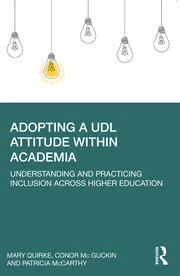


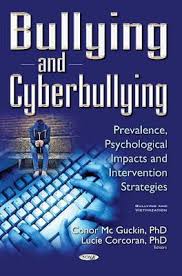
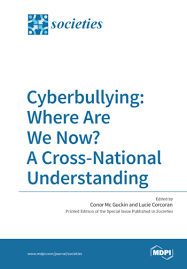
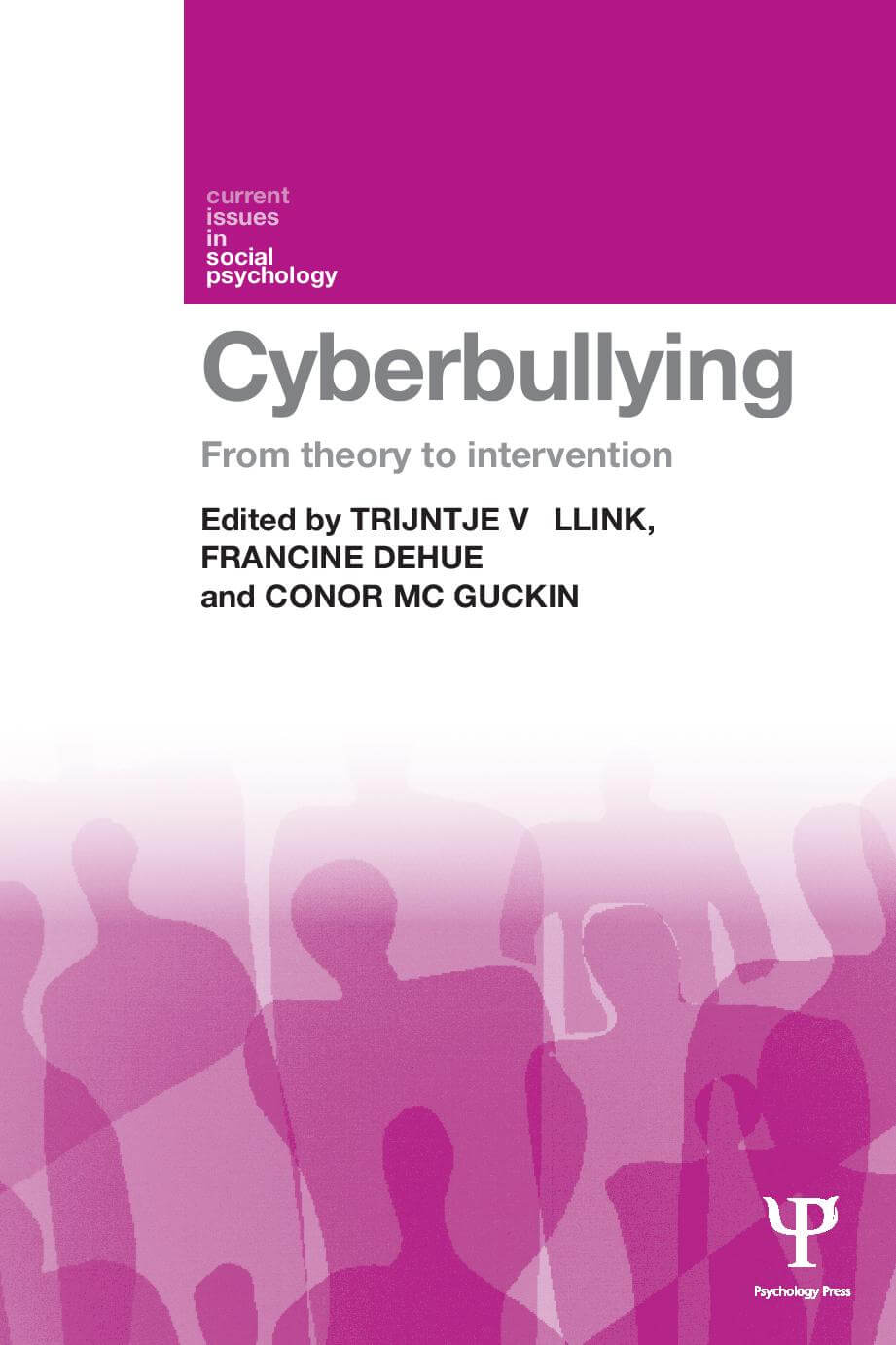
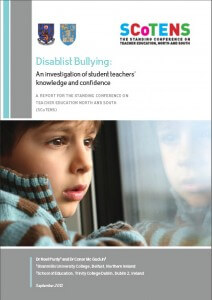 Disablist Bullying
Disablist Bullying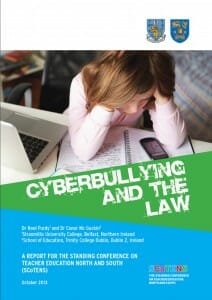 Cyberbullying and the Law
Cyberbullying and the Law